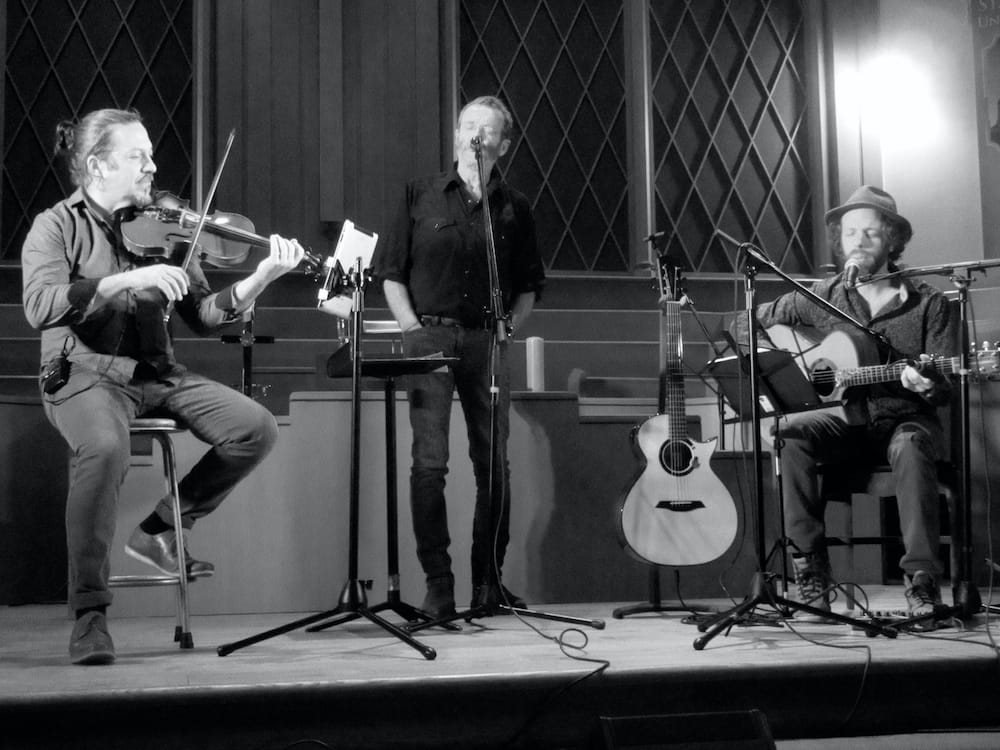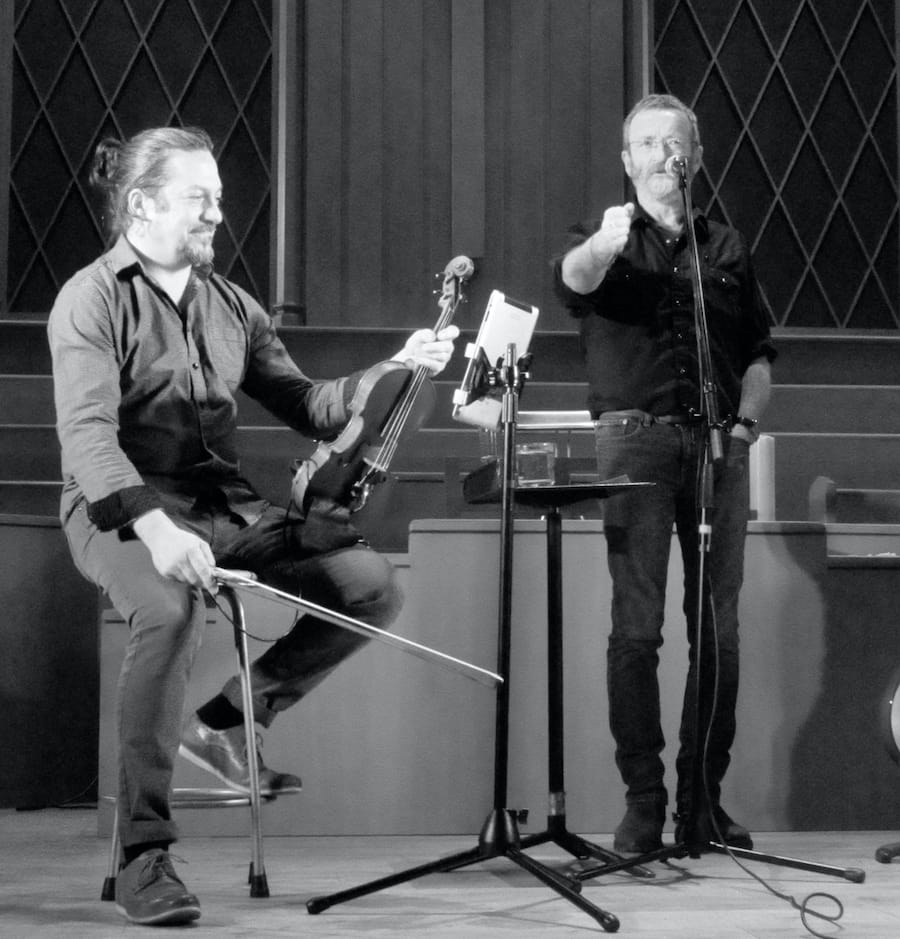The last time I wrote about the Canadian folk artist David Francey was in May 2018, being a review of his 12th album, The Broken Heart of Everything. With its release came the worrying news that after two decades of touring Francey’s voice was shot, so in order to fully recover there would be no live or studio activity for the foreseeable future. What a relief it was, then, to receive news last year that Francey was returning to the stages of Canada and the US, keeping him intermittently busy from last September until this coming November.
Regardless of his need to pay the bills and how much he may miss home, Francey will be delighted about getting back out there. He enjoys the road enormously – especially meeting his fans – so much so that he described the cancellations of domestic, British and Antipodean tours brought about by his enforced hiatus as “absolutely crushing.”
In order to protect his voice from further, perhaps irreparable damage, out of necessity Francey’s tour schedule is now booked in short runs, his brief winter 2019-20 West Coast jaunt including a performance in my town. On the eve of this most welcome return to Nanaimo I caught up with the friendly and accommodating Ayrshire-born folk icon to learn more of his recovery and future plans:
“Concerning the loss of my voice, I kept ignoring it because I love my job and I love the road, but it got to the point where I apparently wore my voice out,” he began. “The only solution doctors came up with was rest, but I went to see a vocal specialist and got a bunch of exercises I could do. Hopefully, it’ll come back 100%; it feels pretty close now, but I have to take it easier than I was prior to that. The slowest thing to come back is the power of my voice, but I know how to work a microphone and, fortunately, I work with a lot of great sound people, so we’re getting there.”
During your time away from gigs and recording I trust you continued to write and amassed a stockpile of songs…? In which case, when might we see a new David Francey album?
“Well, this year I want to get out on the road a bit more and sing songs from ‘The Broken Heart of Everything,’ which I really did love but could not tour. You’re right, I do have a pile of songs and am keen to get back into the studio, but think I need to pace myself, so I’m looking at next year before putting out a new record. Also, I need to build up my confidence again, as it took a bit of a beating with the whole thing. I’ve had so much support, and it’s great getting back into the swing of things, but I want to be well prepared to get back into a studio. I do like my new songs a whole lot, so I am excited about it.”
I’m curious to know if you’ve written a song about how you were temporarily silenced, and what kind of emotional impact it had on you?
“What a great question! I’m taken aback! Well, I haven’t, and I don’t know why I haven’t, but I can tell you this much: you’ve planted a bit of a seed there! I’m dead serious! I’m now sitting here wondering how I avoided writing about it!”
Since you were last on the road there have been many seismic cultural and political shifts around the world, so as a songwriter known for documenting the lives and plights of ordinary people, I’m wondering if there have been any particular situations, events or stories about individuals that have piqued your interest enough to craft a song about it or them?
“For sure. I’m just so disgusted with politics right now, and because it’s getting worse, I really believe we have to look after one another. I watch a lot of news, and it’s massively upsetting, but one of the most shocking things I’ve seen was when I was watching a report from somewhere in the south (of the USA), and there was this woman with a confederate flag and Trump hat screaming into the camera, ‘Fascist and proud!’ I was born just ten years after the Second World War, and my father fought the fascists, and in our house, there was nothing…nothing!… worse in this world than fascists, Nazis, so I just cannot believe that these bastards are walking around with their heads up, proud of ‘what’ they are. How did we allow this to happen? An absolute rejection of this has to happen from us all. Anyway, I did write an acapella song about this called ‘Streets of America’, which is a rant against these fascist hordes.”
My hope is that this pertinent new composition will appear on the next Francey album, no doubt alongside a batch more personal and topical songs of the man’s usual outstanding quality. Until then, we wait, but the following evening there was a show to attend…
The Nanaimo performance was staged at the historic St. Andrew’s United Church, an occasional grand venue for classical and acoustic live music. It had been snowing relentlessly all day, yet the undeterred house was busy with some patrons even having ferried in from the offshore Gabriola and Protection islands. An anticipatory buzz filled the space until Francey, accompanied by Pender Island-based acoustic guitar maestro Adam Dobres and lauded traditional fiddler, Pierre Schryer – an active duo in their own right – took to the stage to loud applause. It had been many years since Francey was in town, so the audience was certainly up for it.
With his voice issues having derailed the opportunity to take The Broken Heart of Everything material on the road following its release, the fifteen-song, two-set show was surprisingly spread across eight releases from his wonderful back catalogue rather than, as it would be reasonable to expect, dominated by the still current album. Just the show opener Lonely Road; the traditional country gospel number (and the evening’s only cover) Walking in Jerusalem, and The Flower of Colonsay were plucked from the latest Francey offering. Like every song at every Francey show, the latter was prefaced with an entertaining story (see below) about its origin, in this instance concerning meeting a beautiful young woman on the ferry from Oban to Colonsay in the Inner Hebrides to perform at the Ceòl Cholasa folk festival some years ago. (It turned out that the ‘flower’ was none other than the festival organizer’s daughter!)
Otherwise, the title tracks from 2004’s The Waking Hour and Empty Train (2016); the jaunty Tonight in My Dreams from the former; Come Rain or Come Shine and Broken Glass from Skating Rink (2003); Paper Boy and set closer Lucky Man from Far End of Summer (2001); Pandora’s Box from So Say We All (2013); The Ballad of Bowser Macrae from 2007’s Right of Passage, and Saints and Sinners, Borderline and the encore, Red-Winged Blackbird, from Francey’s classic, Juno-winning 1999 debut (released at the age of 45), Torn Screen Door, rounded out the beautiful set. All killer, absolutely no filler.
Nine days into a bout of bronchitis – can the man not catch a break? – Francey was a tad hoarse, but in the grand scheme, it mattered not. He is such a seasoned and naturally talented entertainer that, in his instance, shows are as much about his everyman, down-to-earth, super-nice guy persona and more-often-than-not hilarious anecdotes about what inspired his great songs, as they are about said songs. Francey’s introductions can be multiple times longer than the songs themselves, shot through with endearingly morose, self-deprecating humour. Of the several side-splitters at this show, he spoke of his perpetual state of disbelief at how, in their early courting days, his wife of 27 years – acclaimed artist Beth Girdler – inexplicably seemed to find him attractive, potential husband material. He was a rough-edged, chain-smoking, coffee- guzzling, urbanite construction worker; she was a forest-dwelling holistic midwife:
“Every morning I feared Beth would wake up, roll over, take a look at me and, finally realizing her mistake, start screaming…and never stop.”
As a chronicler of experiences, emotions, observations and encounters on his travels, from out of the blocks with Torn Screen Door Francey has been rightly lauded as a master storyteller. As (surely/presumably) at every show he performs, the audience hangs on his every word, and that would include myself. Comparisons can certainly be drawn with the beloved late Canadian broadcaster and monologist Stuart McLean (1948-2017), whose CBC radio show, The Vinyl Café, was and remains a national institution.
Beyond the beauty and poignancy of his material, the symbiosis between Francey and his fans is largely due to his rare relatability and humility: he projects as a man truly grateful for and surprised by where he finds himself in this world, with absolutely no airs and graces. He wears jeans and a plain black shirt, often sings with his hands stuffed in his pockets, and always seems in awe of where he is and what he’s doing there as if feeling he has no right to occupy a stage. And the way Francey interacts with and so deeply appreciates his accompanists is a joy to behold: at the end of each and every song he nodded and gave thumbs-ups to Dobres and Schryer, and during their instrumental passages, he’d bop his head, lost in the music, casting understandably admiring glances at the pair in recognition of their brilliance.
I will be one of the legions of Francey fans hoping his voice can hold out for as long as he wants and is able to do this. He’s now 65 and has toured hard for twenty years, but if, heaven forbid, he finds over time that he cannot sustain a singing career, besides his other creative talent as a visual artist a McLean-style storytelling gig is absolutely his for the taking.
Black and White images by David Morrison


